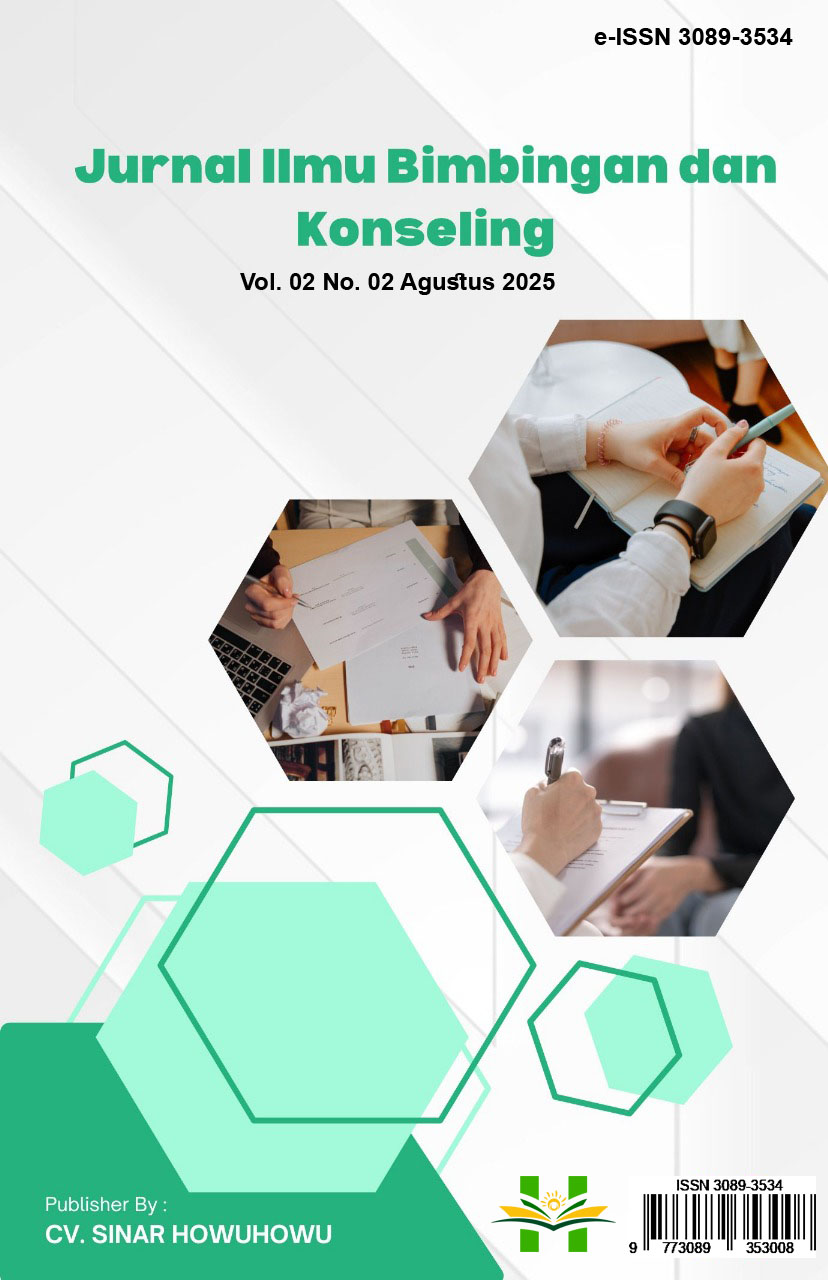Hubungan Antara Manajemen Waktu Dengan Prokrastinasi Akademik Pada Mahasiswa Bimbingan Dan Konseling
DOI:
https://doi.org/10.70134/bikoling.v2i2.659Keywords:
Time Management, Academic Procrastination, College Students, Guidance and Counseling, Self-RegulationAbstract
This study aims to examine the relationship between time management and academic procrastination among students majoring in Guidance and Counseling. Using a quantitative correlational approach, data were collected from 100 students through standardized questionnaires. The results revealed a significant negative correlation between time management skills and academic procrastination levels. Students with better time management were less likely to delay academic tasks, while those with poor time organization showed a higher tendency to procrastinate. The findings highlight the importance of strengthening students' time management abilities as a strategy to reduce procrastination behaviors in academic settings. This study also suggests the need for universities to integrate time management training into their student development programs, especially for prospective counselors.
Downloads
References
Ahmad, S., & Malik, M. A. (2020). Time management and academic achievement of students. International Journal of Educational Research, 5(2), 45–53.
Alghamdi, A. (2021). Procrastination and its relationship with time management among university students. Journal of Educational Psychology Studies, 14(1), 101–118.
Ariely, D., & Wertenbroch, K. (2018). Procrastination, deadlines, and performance. Psychological Science, 13(3), 219–224.
Astuti, L. P. (2020). Hubungan antara manajemen waktu dengan prokrastinasi akademik mahasiswa. Jurnal Psikologi Pendidikan dan Konseling, 6(1), 65–72.
Britton, B. K., & Tesser, A. (1991). Effects of time-management practices on college grades. Journal of Educational Psychology, 83(3), 405–410.
Dewi, R. K., & Prasetyo, T. (2022). Self-regulated learning dan manajemen waktu pada mahasiswa. Jurnal Psikologi dan Pendidikan, 9(3), 134–142.
Efendi, R., & Murniati, A. (2021). Pengaruh manajemen waktu terhadap motivasi belajar mahasiswa. Jurnal Bimbingan dan Konseling Islam, 5(2), 88–95.
Fauzi, A., & Handayani, S. (2023). Prokrastinasi akademik dalam perspektif psikologi pendidikan. Jurnal Psikologi Terapan, 11(1), 76–84.
Firdaus, R. (2019). Prokrastinasi akademik dan strategi pengelolaan waktu. Jurnal Ilmiah Pendidikan, 7(2), 150–158.
Gunawan, H., & Setiawan, D. (2020). Manajemen waktu dan prestasi akademik mahasiswa. Jurnal Pendidikan dan Konseling, 4(1), 60–67.
Hidayat, A., & Syahputra, R. (2022). Hubungan self-control dan manajemen waktu dengan prokrastinasi akademik. Jurnal Psikologi Insight, 8(1), 92–101.
Istiqomah, N. (2021). Strategi manajemen waktu untuk mengurangi stres akademik. Jurnal Konseling Pendidikan, 9(2), 45–53.
Kurniawan, A. (2018). Efektivitas pelatihan manajemen waktu bagi mahasiswa. Jurnal Psikologi, 15(1), 70–78.
Lee, C. J., & Kim, S. H. (2020). Academic procrastination and the role of time perspective. Journal of Learning and Motivation, 11(4), 112–127.
Malik, M., & Zohra, T. (2021). Exploring the causes of procrastination among university students. Journal of Educational Research and Reviews, 9(5), 210–217.
Misra, R., & McKean, M. (2000). College students’ academic stress and its relation to their anxiety, time management, and leisure satisfaction. American Journal of Health Studies, 16(1), 41–51.
Munandar, U. (2022). Psikologi pendidikan dan aplikasinya dalam bimbingan konseling. Jakarta: Rajawali Pers.
Nurhaliza, S. (2023). Efektivitas konseling kelompok untuk mengurangi prokrastinasi akademik. Jurnal Bimbingan dan Konseling Indonesia, 12(2), 122–130.
Oktaviani, E. (2021). Kecerdasan emosional, manajemen waktu, dan keberhasilan akademik. Jurnal Psikologi Pendidikan dan Perkembangan, 10(1), 39–47.
Prasetya, D., & Herlina, S. (2020). Korelasi antara kontrol diri dan manajemen waktu terhadap prokrastinasi. Jurnal Psikologi Insight, 7(2), 88–96.
Pratama, Y. (2023). Penerapan teknik self-management dalam mengurangi perilaku prokrastinasi. Jurnal Terapan Psikologi, 5(1), 33–41.
Putri, A. N., & Ramadhani, T. (2022). Pengaruh motivasi intrinsik terhadap prokrastinasi akademik. Jurnal Psikologi Mahasiswa, 3(2), 56–63.
Rahmawati, D. (2020). Prokrastinasi akademik ditinjau dari kepribadian dan efikasi diri. Jurnal Psikologi Sosial, 9(3), 115–123.
Ramli, M. (2019). Psikologi pendidikan: Teori dan praktik dalam bimbingan konseling. Bandung: Alfabeta.
Rizky, N. (2021). Hubungan antara efikasi diri dan manajemen waktu dengan prokrastinasi akademik. Jurnal Psikologi dan Kesehatan Mental, 4(1), 74–81.
Rustika, I. (2019). Strategi mengatasi prokrastinasi akademik mahasiswa. Jurnal Konseling dan Psikologi, 8(1), 61–68.
Schraw, G., Wadkins, T., & Olafson, L. (2007). Doing the things we do: A grounded theory of academic procrastination. Journal of Educational Psychology, 99(1), 12–25.
Sembiring, T. (2021). Pengembangan keterampilan manajemen waktu melalui pendekatan experiential learning. Jurnal Pendidikan Karakter, 11(2), 95–103.
Setiani, L., & Saputra, A. (2023). Time management training to reduce procrastination behavior in students. Indonesian Journal of Educational Psychology, 15(1), 55–63.
Steel, P. (2007). The nature of procrastination: A meta-analytic and theoretical review of quintessential self-regulatory failure. Psychological Bulletin, 133(1), 65–94.
Downloads
Published
Issue
Section
License
Copyright (c) 2025 Angel Sadut (Author)

This work is licensed under a Creative Commons Attribution-ShareAlike 4.0 International License.













